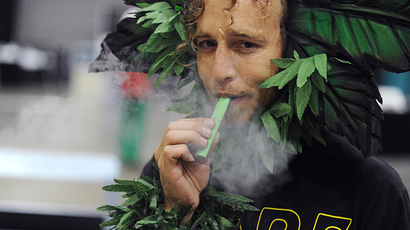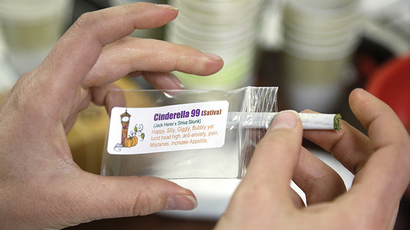Medical marijuana workers start unionizing with government help

Marijuana may still be illegal at the federal level, but the US labor board believes pot workers still have the same rights as any other American employee.
According to the Huffington Post, attempts to unionize by medical marijuana workers in Maine have attracted what some may think to be an unlikely government ally: the National Labor Relations Board.
As a result of complaints filed by the United Food and Commercial Workers union (UFCW) against a Maine marijuana dispensary called Wellness Collection of Maine, the labor board has substantiated some of the claims and notified the company that it will get involved should the two sides be unable to reach a settlement.
While 20 states, along with Washington, DC, have voted to permit the use of medical marijuana, the US government still does not permit the action at the national level. This is believed to be the first time that the NLRB has thrown itself into a dispute in order to protect workers under federal law.
"A lot of people treat the medical marijuana industry as something special, but these are normal workers with normal jobs trying to care for their families and their patients and make their businesses successful," UFCW spokesman Evan Yeats told the Huffington Post. "There needs to be some way for workers' voices to ensure that the best operators are representing this industry."
Among the complaints reported concerning Wellness Connection’s business practices – the company was found to be illegally spraying its marijuana plants with pesticides – the UFCW stated workers received “disciplinary warnings” for participating in union-related activities, that they were “unlawfully interrogated,” and that the company "created the impression amongst its employees that their union activities were under surveillance."
If the two sides cannot agree to a settlement, the labor board will initiate a formal complaint, though exactly which UFCW claims it has substantiated remains unclear.
"I'm optimistic we can settle the remaining charges that are pending before the labor board," Wellness Connection attorney Matthew LaMourie said to Huffington Post. "There hasn't been a settlement yet, but we are confident we'll reach one."
The situation began unfolding last year, when employees brought up numerous issues, including pesticide use, to upper management. According to the pot advocacy website the Daily Chronic, the workers’ concerns were ignored and management told employees to continue using the chemicals. At this point, employees filed a complaint with the Maine Department of Health and Human services, which found Wellness Connection in violation of several regulations.
The company was fined $18,000 dollars and now has to file weekly compliance reports for the next two years.
“During this process, we thought it would be best if the employees could band together to have one voice, and that’s why we decided we would look into forming a union,” Amanda Kaler, a production assistant at one of the dispensaries, said to the website. “We were put in touch with UFCW because they were the folks who organized the union of cannabis workers in California.”
Marijuana employees have become natural recruits for organized labor groups hoping to halt declining membership numbers. Several unions, including the UFCW, have lent their efforts to pot legalization initiatives around the United States. According to a 2013 Reuters report, union members only make up 11.3 percent of the overall workforce.














